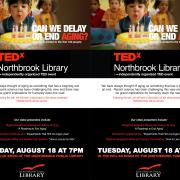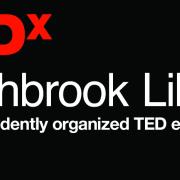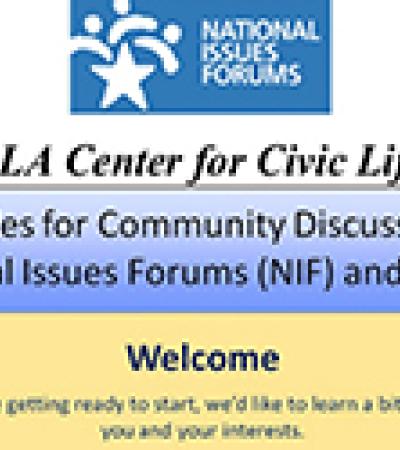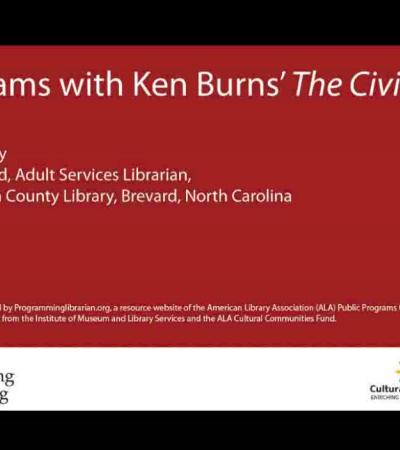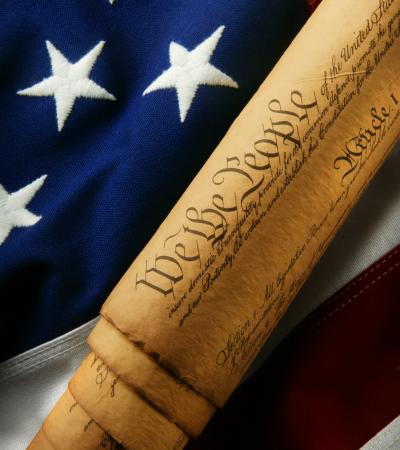TEDxNorthbrookLibrary is a monthly meet-up, licensed by TED, where we watch three prerecorded TED talks around a particular theme and have a group discussion afterwards.
Advanced Planning
The goal of TEDxNorthbrookLibrary is to introduce TED talks to patrons who are unfamiliar with them by offering monthly events with different themes. We hope the events will bring a more personal, face-to-face experience to patrons who are familiar with the TED organization but who would like to discuss the talks with other individuals within our community.
Once we received our license, we surveyed the library staff to see who really wanted to work on these programs. With a committee of eight, we started planning our first session about two months in advance. We modeled our events after Juneau Public Library in Alaska, which developed this low-key approach to the TEDx model. (Most TEDx events attract large groups to hear from live speakers; ours do not involve live speakers, instead offering a "taste" of TED.)
Everyone helped come up with topic ideas, and we pitched them to the group to see if we all thought the community would be interested. We also encouraged patrons at each event to give us suggestions for themes and videos.
Marketing
We are very fortunate to have a full-time marketing and communications person who helped get word out to local and hyperlocal newspapers. We also advertised on fliers inside the library and on local community boards, in our print and email newsletters, and on our library’s social media channels.
Because we have a TEDx license, we also have a dedicated page on ted.com. This page has information on our events and a link to our registration page, which helps pull people in who already love TEDx events and may not typically come to library programs. So far, marketing has been a success. We have a 100-person cap on attendance, due to our license agreement. I never dreamt it would get anywhere near capacity, but at our first event we had 45 people, and at the next event we had 82.
Budgeting
The license is free, so there was no fee to apply.
We do offer refreshments at each program. We spend no more than $30 each month for these. It is a nice addition, but not necessary.
We are facilitating the discussions ourselves, so we don’t have any fees for outside speakers. Outside speakers or experts would definitely be a viable option for these events, but we had enough experienced staff to help facilitate the discussions. Plus, since we are a committee, we are able to ensure everyone is on the same page and knows to be a neutral presence during the discussion.
Day-of-event Activity
About a week in advance, we download the videos we'll be showing onto a laptop. We also buy the refreshments the day before. The chairs and room set-up are done in advance by our maintenance staff.
About 30 minutes before the program starts, we check the equipment and test the videos and volume.
We run the programs with at least two staff members: the person leading the discussion and an assistant. The assistant checks people in at the door, verifying who registered ahead of time, and only let walk-ins into the room based on the number of people who registered (e.g. if 40 people signed up, we know we can let 60 people walk in). The assistant also dims the lights and works the laptop as needed. Once we watch all three videos, we begin the discussion. At this point, the assistant takes notes on the discussion for an event recap we post on our website afterwards. The assistant can also help steer the conversation as needed (e.g. give answers that keep the discussion on topic and moving along).
For more information, see "Hosting the TEDxNorthbrookLibrary event" under Attachments at right.
Program Execution
Our first event in July 2015 revolved around our relationship with social media and technology. For this session, we showed:
- Monica Lewinsky's "The Price of Shame"
- Stefana Broadbent's "How the Internet Enables Intimacy"
- Juan Enriquez's "Your Online Life, as Permanent as a Tattoo"
There were 45 attendees, and they really did a wonderful job of sharing their thoughts and being respectful even when they disagreed. Feedback was positive, although people have repeatedly mentioned changing the chair set-up. We want everyone to be able to view the screen, but then face each other once the discussion starts. Our solution was to stagger the seats on an angle for the second event, but it is something we are still working on.
Our second event was about the idea of delaying or ending aging, where we showed:
- Aubrey de Grey's "A Roadmap to End Aging"
- Cynthia Kenyon's "Experiments that Hint of Longer Lives"
- Dan Buettner's "How to Live to be 100+"
This one was surprising in that we had 57 people registered, but 25 walk-ins showed up, so it was larger than we initially expected.
Our next event will focus on education perspectives and will concentrate on the following talks:
- Sir Ken Robinson's "Do Schools Kill Creativity?"
- Salman Khan's "Let's Use Video to Reinvent Education"
- Rita F. Pierson's "Every Kids Needs a Champion"
So far, I would consider our events a success. We had people at the first event sign up for the second right away. The recaps provided people with something concrete to refer to after the event. And most importantly, it got people talking (both as a group and in individual clusters afterwards).
TED provides a TEDx post-event evaluation that is emailed to participants. Our registration system provides us with the participants’ emails. We then send the email addresses to TEDx. Their evaluation asks participants on a scale of 1 to 10 how likely they are to suggest the program to a friend, then allows for additional comments. We were nervous about providing patrons' emails to a partner, but TED confirmed that the patrons will receive only the survey, and no additional emails of any kind.
We also have our own library program survey available for patrons who prefer to not share their emails. The TEDx evaluation is important for the future if you choose to renew your license. It is also nice because since it is from TEDx, I think the attendees feel more comfortable being honest.
For an example of Northbrook's evaluation, see "Program Survey Form" under Attachments at right.
Advice
Be prepared to read through a lot of information and determine what fits your library’s needs and budget. More and more public libraries are creating live TEDx events, which is far more involved than what we are doing, but if you want to go live I would suggest contacting libraries who have done so. Robert Barr, director of Juneau Public Library, was invaluable in providing information for both our application process and program logistics. Without his template, it would have been difficult to determine a solid structure for these events.
We applied for a license at a patron’s suggestion, and we knew many patrons had an interest in TEDx already. So we knew the interest was there. If you are holding monthly events, make sure you have people on staff to assist with them. My colleagues have come up with amazing ideas for topics that I never would have thought of, which creates more interest for patrons since the events are being brainstormed by a group of people. And hindsight being 20/20, it would have been very hard for me to tackle these events alone without assistance.

